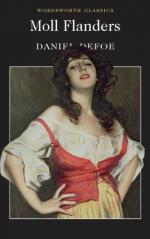|
This section contains 7,888 words (approx. 20 pages at 400 words per page) |

|
In the following essay excerpt, Richetti focuses on Defoe's characterization of Moll Flanders, especially her moral ambiguity.
Critics have always recognized that Defoe's strong suit is the richly particularized incident, his weakness developing connections between epi-sodes. At first glance, Moll Flanders (1722) looks like the most formlessly episodic of Defoe's books, with over a hundred separate scenes tied together by rapid synopses of other events. And yet most critics would agree that Moll is Defoe's most memorable character, her story the most widely read and highly regarded of Defoe's fictions in the last fifty years. Where Jack seems a shadowy figure, an excuse for stringing adventures together, Moll has struck many readers as profoundly real. Her concreteness may be partially the result of her narrative's narrower setting; she spends most of her time in and around London. But a more important reason for the relative depth and unity...
|
This section contains 7,888 words (approx. 20 pages at 400 words per page) |

|




